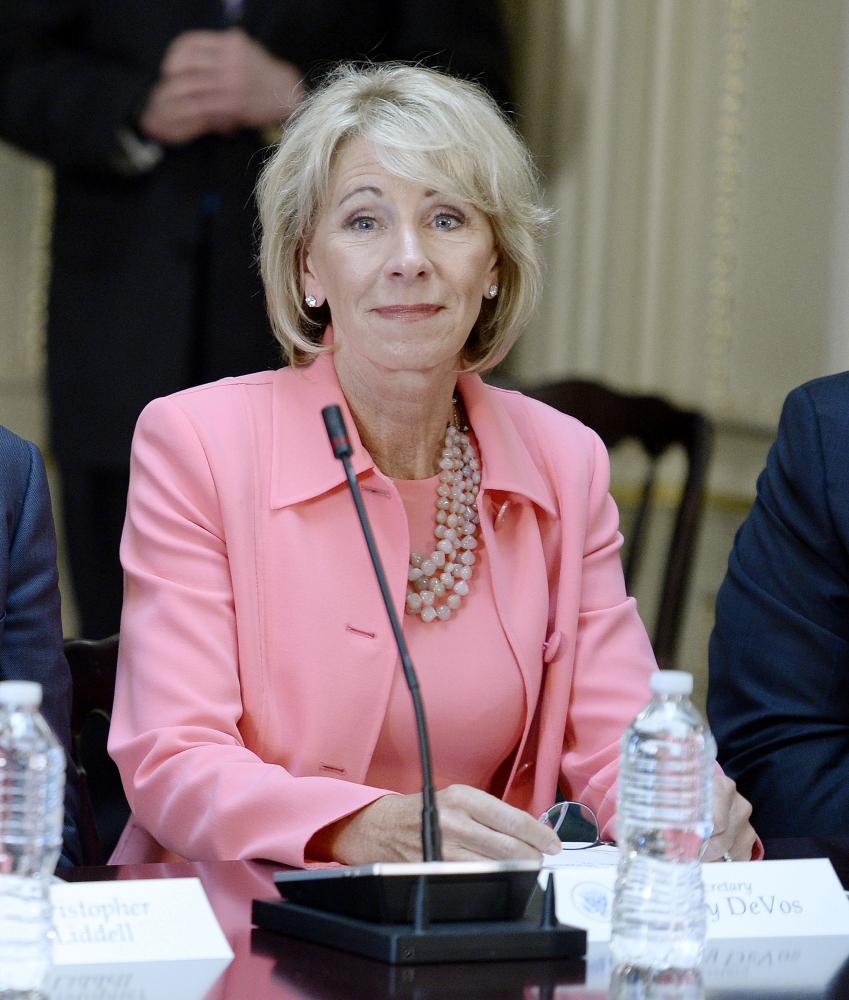Betsy DeVos rolls back Title IX protections on campus
Oliver Douliery | Abaca Press | Tribune News Service
Education Sec. Betsy DeVos listens as U.S. President Donald Trump speaks during a strategic and policy discussion with CEOs in the State Department Library in the Eisenhower Executive Office Building on April 11, 2017, in Washington, D.C. DeVos has rescinded Obama-era guidelines on campus sexual assault. (Olivier Douliery/Abaca Press/TNS)
United States Secretary of Education Betsy DeVos released a statement last Thursday at George Mason University regarding the future of Title IX protections on college campuses nationwide. While a copy of her address was not released prior to her announcement, it was widely expected, and later confirmed, that she would rescind many protections offered to college students who experience sexual assault.
Title IX, which was signed into law in 1972, is a broad equal opportunity program that prohibits federally funded universities and colleges from discriminating against any student based on gender.
While the law was originally written with women’s sports teams in mind, the protections are far-reaching and most well known for protecting the rights of sexual assault victims on college campuses. Additionally, Title IX has become a fundamental aspect of university administration in the last 30 years, and Title IX officers dedicated to upholding the legislation can be found in many universities, including UNCW.
DeVos announced Thursday that the United States Department of Education will roll back many of the guidelines regarding Title IX compliance.
According to RAINN, the largest national anti-sexual assault organization, women in college aged 18-24 are three times more likely to be victims of sexual assault compared to women who are not in college. Sexual assault on college campus is a highly pervasive issue affecting roughly one in every four women enrolled in college.
Proponents of Title IX guidelines such as the group End Rape On Campus [EROC] have expressed their disapproval of the move by DeVos.
“I’m very concerned about what it means for the federal government’s view on sexual assault, and their view on survivors, for them to possibly rescind a guidance that is critical in helping students understand what their own rights are,” a spokesperson for EROC said to Huffington Post.
A common concern among organizations like EROC is that a decision by the federal government to roll back Title IX regulations will lead to universities no longer complying with a law that is often seen as the sole protection sexual assault victims on college campuses are given.
The decision by DeVos was not unexpected. In July, DeVos received public criticism for meeting with men’s rights groups such as the National Coalition for Men [NCM] to discuss the prevalence of rape culture on college campuses. Groups such as the NCM are well known for acts such as publishing the names and pictures of women on college campuses who they deemed to be “false accusers.”
The announcement regarding rollbacks of Title IX compliance has not gone unnoticed on UNCW’s campus. Abigail Wise, a Peer Coordinator with CARE, weighed in on the issue.
“DeVos’s decision to have a higher standard of evidence placed an unequal burden on survivors and their safety on campus,” Wise said. “Her choice to repeatedly meet with men’s advocacy groups legitimizes victim blaming, while statistical evidence of false reporting contrasts these claims. Furthermore, she is treating university hearings as equal to criminal cases, begging the question as to whether or not Title IX should even be handling sexual assault cases.”
The full extent on DeVos’s plan to roll back Title IX guidelines will be elaborated on in the coming months, and proposed changes may be implemented as soon as the start of the New Year in 2018.








